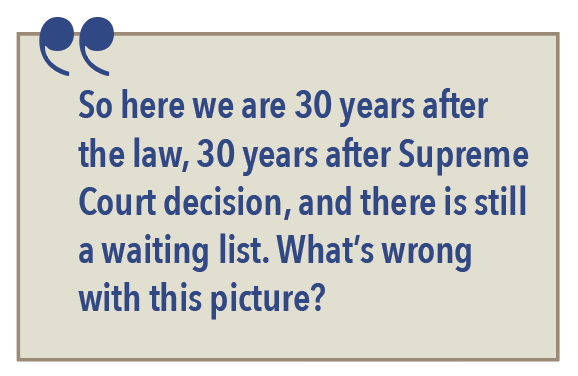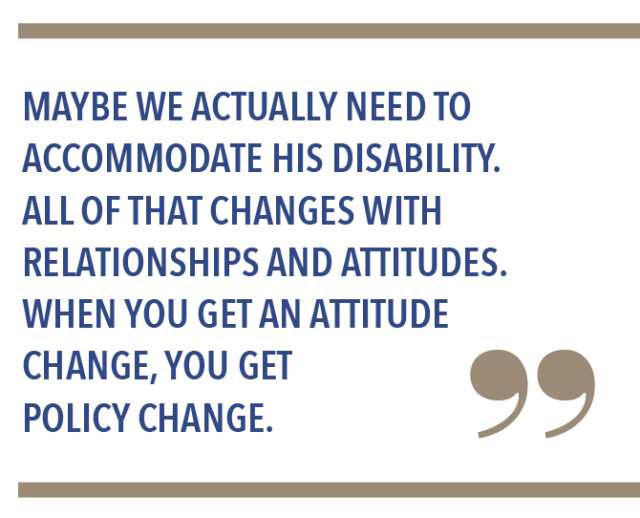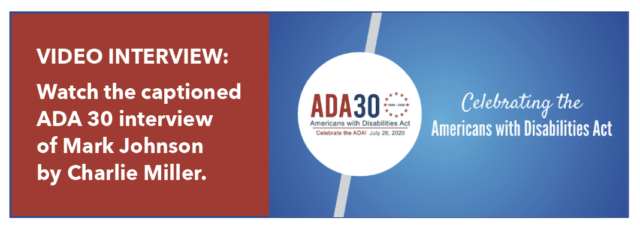Georgia Council on Developmental Disabilities (GCDD) Legislative Advocacy Director Charlie Miller interviewed Mark Johnson, renowned disability advocate and former director of advocacy at the Shepherd Center, on what it was like to advocate for the Americans with Disabilities Act, what the future holds and his advice for young advocates.
Charlie Miller: What was your biggest “I can’t believe I lived without this” moment once the ADA got passed?
Mark Johnson: Well, I got injured in 1971 and then, I got involved in Section 504 of the Rehabilitation Act in the late ‘70s, but none of them addressed or were as broad as the ADA. So back in those days when – I drive a modified or accessible van – you didn’t really have building codes that addressed access so there were a lot of physical barriers. You weren’t able to use public transit. There were just a lot of issues. You weren’t able to go down to Tybee Island and get on Beach Manning. You weren’t able to access power beach chairs in Orange Beach, Alabama, or Destin, [Florida]. You weren’t able to do all those things so you kind of did what you could do. So, I think the “aha” moment was when I was sitting on the White House lawn on July 26, 1990 with 3,000 other people in very hot weather.
You finally kind of got acknowledged as a person, you know? Not somebody to be treated differently or be discriminated against. It was like after all those years where people with disabilities were separated, isolated and discriminated against – it was like, okay change takes time, but now we have a new tool in the toolkit and that’s the ADA. So that one thing was just seeing that many people with that much history and understanding had started a new narrative.
 Charlie Miller: I think it’s really important for us to highlight that, like you were saying, the ADA is there. But there are other laws and other things like the Olmstead decision that has really impacted our community.
Charlie Miller: I think it’s really important for us to highlight that, like you were saying, the ADA is there. But there are other laws and other things like the Olmstead decision that has really impacted our community.
Mark Johnson: And think about that. [The Olmstead decision] didn’t come along till like nine years after ADA.
Well, I once had this theory, and I think I’ve told it to you before: “if common sense worked, we wouldn’t need laws.” So unfortunately, we had to pass the law, but sometimes they don’t go far enough. People who study history realized that the law itself should have been enough in 1990, but we had to go and sue the state of Georgia to enforce [the ADA] nine years later. And, if you look at the enforcement or implementation of Olmstead in places like Georgia, the home of Olmstead, we still have a long way to go. So here we are: 30 years after the law, 30 years after the Supreme Court decision, and there is still a waiting list. What’s wrong with this picture?
Charlie Miller: Well, I think that brings me to my second question. You’ve seen ADA, you’ve seen Olmstead, you’ve seen the Rehab Act – all really instrumental laws and regulations to help people with disabilities. I was listening to one of Kate Gainers’ interviews and she was saying that she does not envy the younger generation because she sees so many new barriers coming up. It may not be a physical barrier, but it may be a new barrier. In your own knowledge, what do you think will be the next big barrier for the disability community?
Mark Johnson: You still obviously have employment, underemployment. That one hasn’t gone away and it really hasn’t changed much since ADA passed. We still don’t have equal access to healthcare and look what’s happened with the pandemic. We still have a variety of systemic issues whether race injustices or whatever that needs to be addressed. So, you can look even within the disability community and say, “Okay, who tends to be forced into facilities and who tends to be not employed and who tends to have lack of housing?” And, you break that down demographic even more.
And then, we have the same old issues. Just because we say ADA required accessible buses in public systems, then you had to work with over the road coaches, and then you had to work with travel companies. Now you go, “Okay, can I go out to the local RV dealership and find an accessible RV?” When I rent a car or rent a van from a rental company, I have to go to a niche or specialty van company and pay a bunch more than I would have to pay if I would just rent it as a van from a rental company. If you look at Uber or Lyft, we don’t have the same level of access to those transportation modes as other people. I could go on. You asked me for one or two or three and I gave you eight or 10 really quick.
 Charlie Miller: I totally agree with that. And I think you’re right. We’ve started a really good opportunity; we have really good laws behind us. And, now we’ve just got to make sure – to get the community to be involved to want to make it as accessible as possible because they see the value in making stuff accessible.
Charlie Miller: I totally agree with that. And I think you’re right. We’ve started a really good opportunity; we have really good laws behind us. And, now we’ve just got to make sure – to get the community to be involved to want to make it as accessible as possible because they see the value in making stuff accessible.
Mark Johnson: Well you’ve always been good with people. You know. It’s easy for you to establish relationships with people. You’re not one to sit inside and not come in contact with people. When it’s all said and done the answer is relationships. You surprised your family; you surprised your family’s friends. I would think they’re probably looking at access differently now that you’re a young man than they did when you were that kid who uses a wheelchair. “We’ll get him in,” versus now they’re asking, “Can he roll in?” Can he use my bathroom?” Maybe we don’t need to just drag him here or carry him there, but maybe we actually need to accommodate his disability. All of that changes with relationships and attitudes. When you get an attitude change, you get policy change.
Charlie Miller: So, our final question – and it’s an open-ended question. You’re welcome to spend as long as you want on it. Imagine you’re talking to a young advocate named Charlie. What is one piece of advice you would want to leave to that next generation to give them an understanding of what they are going to have to do and then what do you see as the next big push?
Mark Johnson: At the end of last year, some of us were having a talk about what 2020 might look like. What are the opportunities for 2020, and of course, we were talking about more around this November? What would different outcomes look like? How would people respond based on who gets elected – not just as President but down-ticket? We said it’s going to be one of those transformative years, but that was before we had the pandemic or before we even had VIDEO INTERVIEW: Watch the captioned ADA 30 interview of Mark Johnson by Charlie Miller. some of the recent protests. And, that was before Gen Z recognized that they’re 10% of the voting population. I’m a Baby Boomer, then you’ve got your Millennials and Gen X, but Gen Z has woken up now and said, “Hey, we potentially control 10% of voters.” It is an opportunity. We’re learning things and we’re not going back.
 So, it’s like that old Nike saying, “Just do it.” And then it’s like, just do it now. Understand that your personal experience makes you an expert. Nobody’s going to teach you that, and you don’t have to learn that first. Just know that your personal experience makes you an expert, so just go out and be an expert.
So, it’s like that old Nike saying, “Just do it.” And then it’s like, just do it now. Understand that your personal experience makes you an expert. Nobody’s going to teach you that, and you don’t have to learn that first. Just know that your personal experience makes you an expert, so just go out and be an expert.
[aiovg_video id=2527]
